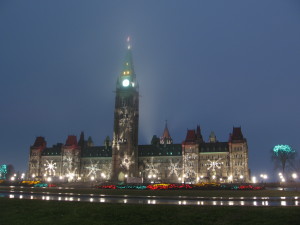In just the last few weeks of Canadian politics, these stories about changes to our Parliament, parties, elections and citizen involvement have made headlines:
NDP scores surprise win on e-petitions thanks to 8 Tory MPs
Trudeau cuts Liberal senators loose in push for non-partisan Red Chamber
Parliament Resumes WIth Tory MP rebelling against muzzling by own government
Conservative MP introducing motion on choosing House committee chairs
Tory Senator urges colleagues to be less partisan
Conservatives’ election bill cracks down on robocalls, fraud
and of course there’s still this hanging out there:
Senate scandal propels Chong’s Reform Act
All these individual currents, affecting different aspects of our governance, coming from different parties, can be housed under the tent of democratic reform.
Democratic reform is a vague phrase, and a bit self-congratulatory, but there’s no real catchy alternatives: “reform of the various mechanisms by which we govern ourselves” isn’t any better.
With the exception of the Elections Canada reform introduced this week by Conservative MP Pierre Polievre, all the reforms listed above (six of ’em, count em!) are aimed at hacking away at the power in party central.
Some of the proposals are big, some are small, but there is an inexorable trend here, with support from all parties, towards empowering legislators and ridings at the expense of the party leader’s staff or the Prime Minister’s Office.
The fact that this trend exists right now is a reaction to the mood in Canada (and this is reflective in the elections reform as well): we don’t trust our politicians, we want more controls, more openness, and less partisanship.
This is good. No system of government is immune to corruption, and I don’t just mean corruption of individuals, I mean corruption of the system; of the system itself changing. There is inevitable power creep, and over time the players learn how to rig the game within the rules. Look for example at President Obama’s use of recess appointments to avoid Senate confirmations, or the expansion in use of the filibuster in the same Senate. This happens over decades, but power is hardly ever given back.
We need a bit of a reset towards openness, accountability and local voice.
The news is also interesting in that the Conservatives, with a majority, have the power to stop all reform. The fact that Prime Minister Harper is allowing open votes on some of these issues, and that conservatives are breaking ranks, speaks volumes.
Either the prime minister is feeling pressure on these issues, or he is sympathetic to the ideas, or… he figures he’s out of here soon and won’t be around to feel the effects.
Whichever it is, it’s time to keep the pressure on, and keep talking about Chong and Trost and Vellacott’s bills to come.
(And don’t forget Brent Rathberger’s idea that our elections law unfairly empowers parties in all sorts of ways vs independents, when 98% of Canadians don’t belong to parties).
For the record, here are the Conservative MPs who broke ranks with their party on the NDP motion on e-petitions: Leon Benoit (Vegreville-Wainwright); Garry Breitkreuz (Yorkton – Melville); Michael Chong (Wellington – Halton Hills); James Rajotte (Edmonton – Leduc); Kyle Seeback (Brampton West); Brad Trost (Saskatoon – Humboldt); Maurice Vellacott (Saskatoon – Wanuskewin); John Williamson (New Brunswick Southwest)
As democratic shifts go, the cumulative effects of these moves may indeed be minor. But this is Canada. That’s how we roll. Maybe it’s all we need.

Leave a Reply